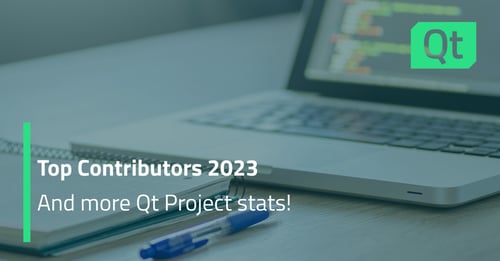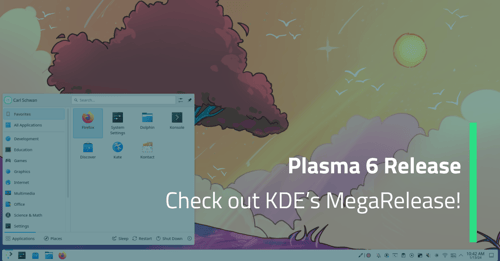The next step for Qt open governance. The Qt Project goes live in time for Qt Developer Days in Munich
September 12, 2011 by Daniel Kihlberg | Comments
We are extremely happy to announce that the Qt Project, the outcome of the open governance work, will go live on October 17th, 2011. This is a week before Qt Developer Days in Munich, and you can be sure to hear more about it there!
Since the Open Governance Model discussions started in July 2010, we have worked closely with the community to restructure the code base, design the governance structure, prepare the tooling, and define a contribution model for individuals and companies. And, we are excited to have a system in place that will be rolled out just five weeks from now.
Transparent and equal access to all
The Qt governance, roadmap and releases will be driven openly by the Qt Project - open to all the stakeholders willing to contribute. It will have an open governance model based on equal access to all discussions and tools, an open contribution process and meritocratic assignment of roles. We want Qt to excel by all measurements as a transparent, merit-based and participative open source community project. We believe this is the key to speeding up development and increasing the adoption of Qt.
Nokia continues to be the main contributor to the project, embracing Qt for its strategy to reach the next billion of mobile web users. As always, other parties continue to be invited to join the project, working on current releases and defining the future of Qt.
Empowering the Qt community of close to 500,000 developers
The changes in the governance model will make it easier for more stakeholders to participate in the evolution of Qt. We made a big change towards broader adoption of Qt with the introduction of the LGPL v2.1 license in 2009. The changes in the governance model are the next significant step to empower the Qt community. Over the last few years Qt has received tens of thousands of bug fixes and thousands of code contributions from contributors, including commercial licence holders, and we expect the governance model to simplify and speed up contributions. More contributions mean more value to the project and the contributors themselves.
Qt maintainers and contributors, regardless of license choice, want a system to ensure that Qt can properly accept and incorporate those contributions –quickly. We hope you will like the new setup and get involved in its improvement and the benefits it will offer. By design, the Qt Project will result in richer releases, faster innovation and increased stability for Windows, Mac and X11 desktop users as well as Linux distributions, Linux platforms and Real Time Operating Systems that use Qt as preferred UI and application framework.
Qt is part of bringing apps to the next billion Nokia users
At the end of June 2011, Marco Argenti, SVP, Nokia Developer Experience, confirmed that Nokia will “make Qt core to bringing applications to the next billion,” and he reassured developers that investments made in Qt today will live on in the future with Nokia. Adding the information about the 9M+ downloads per day on the Ovi Store, already today, provides a hint about the opportunity developers have with Nokia.
Nokia will continue to be a leading contributor to Qt and will focus its future Qt work on devices that connect the next billion users to the web.
Qt is also used for Nokia terminal mode in cars, which will allow selected Nokia phones with Qt to connect to in-car displays, car controls systems, and car audio systems. Needless to say, Qt is also used for advancing upcoming Symbian smartphones with the Belle UI as well as the Nokia N9.
Nokia is driving Qt’s broader ecosystem for the same reason as many other companies using Qt for their future products: Qt gives faster time to market, better user experience, and a strong developer ecosystem.
Qt Project expected to increase adoption of Qt and increase consumption of Qt apps
In my earlier blog post I happily shared the news that the intake and submission of Qt apps in Ovi store is catapulting. In more recent news, a new research study has been released showing that the average applications in the Ovi store were downloaded 160% more times than average iOS applications.
In addition to handsets, we see that the use of Qt on desktop continues and increased use of Qt in various embedded segments. Automotive infotainment systems and a wide range of consumer electronics devices are good examples of segments where Qt apps also can evolve. Qt is used by many automotive suppliers and manufacturers in alliances/consortium such as Genivi and MirrorLink. Qt, on embedded Linux and RTOS like QNX, is bringing the Web, Qt apps and new UI possibilities to multiple companies creating a wide range of solutions including consumer electronics.
I expect the amount of Qt apps on those device types to increase now when more developers – by active involvement through transparent decision making and open contribution model - have even better chances to actively influence the roadmap of Qt. Already at launch, the team of nominated Qt maintainers has close to 15% of developers from these active community members.
Check out more details about the Qt Project and how it works in Chief Maintainer Lars Knoll’s Qt Labs blog.
Daniel Kihlberg
Director, Qt Ecosystem
Blog Topics:
Comments
Subscribe to our newsletter
Subscribe Newsletter
Try Qt 6.7 Now!
Download the latest release here: www.qt.io/download.
Qt 6.7 focuses on the expansion of supported platforms and industry standards. This makes code written with Qt more sustainable and brings more value in Qt as a long-term investment.
We're Hiring
Check out all our open positions here and follow us on Instagram to see what it's like to be #QtPeople.



